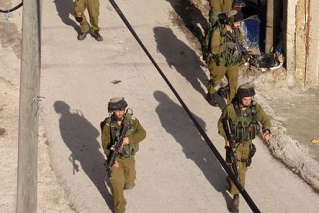 Israeli soldiers in Awarta (photo via Wikimedia Commons).
Israeli soldiers in Awarta (photo via Wikimedia Commons).The Turkel Commission was appointed following the Marmara flotilla affair in 2010 to investigate the legality of the actions of Israeli soldiers and commanders in that operation. Following continued intense criticism over alleged war crimes, the commission’s mandate was extended to release a second report on the efficacy of Israel’s security apparatus’ system of self-investigation. The second report was released on February 6, 2013.
The rulings and recommendations of the new report point to extremely significant deficiencies in the state of criminal law in Israel and in the mechanisms through which the security apparatus of the state conduct investigations. These include the processes of the IDF, the Israel Security Agency and the police. The commission determined that the methods of investigation are generally consistent with international standards, yet expressed strong criticism of all components of the investigation into the flotilla incident, beginning with the fundamental decision of what violations require an investigation (“what to investigate?”), through to the criteria for opening an investigation (“when to investigate?”) and the manner in which the investigation conducted itself (“how to investigate?”).
Among the most important recommendations of the Commission, welcomed warmly by ACRI, is the entrenchment of international legal norms relating to war crimes within Israeli criminal law; the imposition of criminal responsibility on military commanders and civilian decision makers and as well as the severance of the link between operational debriefings and the decision of whether to open a military police investigation. The Commission recommended establishing appropriate policy regulations with regard to the launching of military police investigations. These regulations were altered following an appeal by ACRI and B’Tselem to the High Court of Justice in 2003. (HCJ 9594/03).
Great importance is also placed on the recommendation to enhance the independence of the military advocate-general by means of subordinating the position to the Attorney General and thus weakening its dependence on the military Chief of Staff. Ensuring the rights of victims to receive information about the proceedings that have been taken against suspects related to the crime, and determining a limited time frame for investigations may propel the wheels of justice and streamline the work of the military police significantly. Imposing a duty on the Israel Security Agency to record interrogations and moving responsibility for examining complaints against the agency to the Ministry of Justice, will contribute substantially to placing the agency’s activities under the auspices of the law.
Establishing a body within the Ministry of Justice that specializes in war crimes will enable a certain level of civilian supervision over the work of military prosecutors. This is not to ensure the full independence of the investigations, something that ACRI explained was essential before the Commission in writing and orally, but this is a step in the right direction.
We must make sure that public decision makers do not hide behind the Commission’s general statements regarding “the need to generally settle the mechanisms for complaints and allegations of violations of the law under international legal norms”. Rather, the Commission’s concrete recommendations must be implemented in full.
To read the Turkel Commission’s first report, published in January 2010 (In English), click here.







